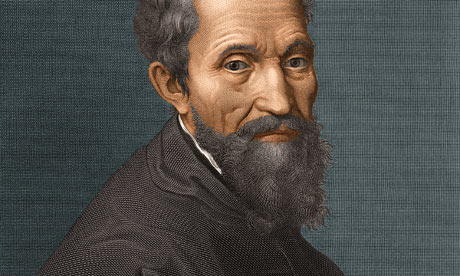- Whoever loses the general election next month may take solace in reading about art and politics in 16th-century Italy

He designed brilliant fortifications for the defence of republicanism ... an engraved portrait of Michelangelo. Photograph: Stock Montage/Hulton Archive
All political careers end in failure – who said that? – but they do not all end in torture. Whoever loses the general election, the pain will be spiritual, not physical. Armed men will not seize David Cameron (let's assume a Labour win) and subject him to exquisite physical pain in the dungeons of 10 Downing Street.
But that was how the political career of poor Niccolò Machiavelli ended, slightly less than 500 years ago. In 1512, Spanish troops that were sent to restore the Medici family to power in Florence sacked the nearby city of Prato, slaughtering troops who had already surrendered and sending streams of refugees through the gates of Florence.
Machiavelli worked in the Chancellery of the Republic these soldiers came to crush. He helped his boss, Piero Soderini, escape, was suspected of conspiring against the new regime and was tortured. He was allowed to live, but excluded from political life, driven into very early retirement at his farm outside the city. That was where he wrote his great book The Prince – which is at once a fantasy of the power he lost, and a dark exposure of tyranny's secrets.
My book The Lost Battles is about the politics as well as the art of Renaissance Italy: the "lost battles" it tells of are not only vanished masterpieces by Leonardo da Vinci and Michelangelo but the lost battle to defend republicanism in 16th-century Florence. Both stories came together when Michelangelo designed brilliant fortifications to defend the last republic during the siege of Florence in 1529-30.
So I was aware over the last few months of the probable irony that my tale of political defeat in 16th-century Italy would appear round about the time of a general election, with its drama of victory and defeat.
Republicanism is a political tradition the loser might take consolation in reading about this summer: from classical times to the Renaissance, it always seemed doomed to fail. In the first century BC, the Roman republic was replaced by autocratic rule; when Renaissance intellectuals such as Machiavelli revived its ideas, they revived the pessimism of its history, too, as told by Tacitus and as witnessed by Cicero. In his bust of Brutus, the diehard republican Michelangelo commemorates tyrannicide, but when he carved it he was already living the life of a defeated political actor, albeit a successful artist: for the last 30 years of his life, he refused to ever go home to Medici Florence. Defeat hurts.
No comments:
Post a Comment